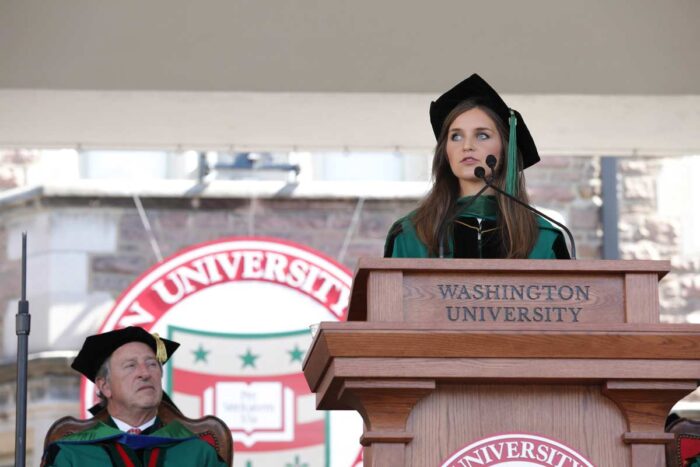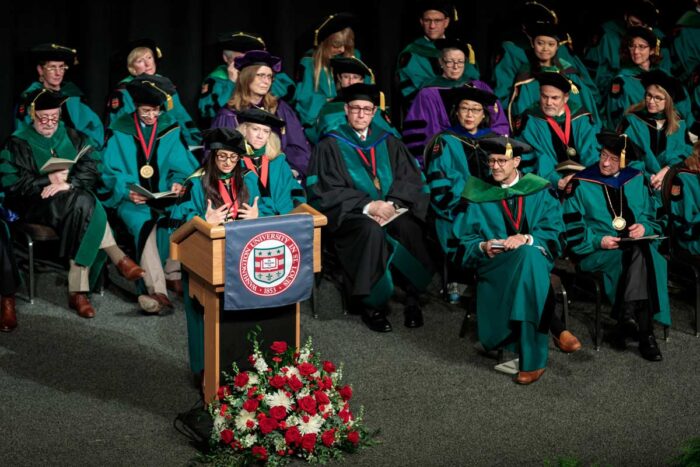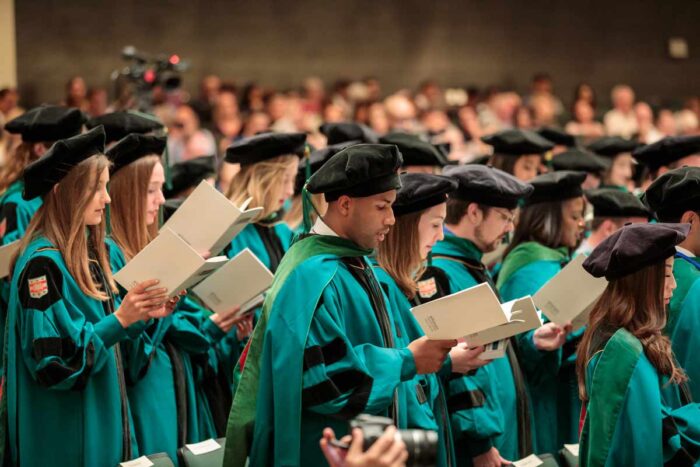Best wishes, Class of 2019!
Gratitude, truth and perseverance: Washington University School of Medicine celebrates the Class of 2019.
Video: Huy Mach/Gaia Remerowski
Gathering at the historic Danforth Campus, graduates, faculty, family and friends celebrated the 158th Washington University Commencement ceremony on Friday, May 17, 2019. School of Medicine graduates also were honored at their programs’ individual recognition ceremonies.
Keep scrolling for coverage of Commencement ceremonies celebrating Washington University School of Medicine graduates, or jump to the ceremony for graduates of:
This page will develop as new photos and updates become available.
All-university Commencement
8:30 a.m. Friday, May 17, in Brookings Quadrangle on the Danforth Campus
A familiar face led the morning’s universitywide Commencement ceremony, with former School of Medicine dean Larry J. Shapiro, MD, serving as Honorary Grand Marshal. Outgoing Washington University Chancellor Mark S. Wrighton, PhD, thanked Shapiro for his dedication to the university and passion for medical education, research and care.
https://twitter.com/mcbridetd/status/1129389932022308864
Michael Bloomberg, former mayor of New York City and founder of Bloomberg LP and Bloomberg Philanthropies, delivered the keynote address. The previous day in downtown St. Louis, Bloomberg announced the Midwestern Collegiate Climate Summit. The summit will convene leaders from Midwestern universities, local government and the private sector to drive regional action to mitigate the effects of climate change. Washington University will host the summit in early 2020 and serve as its anchor institution.
Addressing graduates on Friday, Bloomberg said, “Universities have a critical role to play in tackling (climate change), and I want to thank everyone at WashU who has been a part of that work. There really is no time to waste.”
My message to @WUSTL’s Class of 2019 today: to meet the challenges of our time, we must all do our part to reclaim our civic dialogue from those who are debasing and degrading it. #WashU19 https://t.co/DXBY2tqwsX pic.twitter.com/oRmrZVKU9D
— Mike Bloomberg (@MikeBloomberg) May 17, 2019
Contrasting political science with hard science, he beckoned the graduating class: “When government tries to gag scientists and censors our conclusions, watch out and speak up. America’s progress depends on a dialogue that treats these issues not as pawns in a political battle, but as as problems to be solved.”
“Real patriotism is about bringing truth to light and, when action is required, standing up and taking action.” @MikeBloomberg #WashU19
— WashU (@WashU) May 17, 2019
“Take pains to hold our leaders accountable for their words and their deeds,” Bloomberg told the graduates. “If you do that, I have no doubt that truth in America will prevail and my generation will be able to say as we pass the leadership torch to yours the same words that (George) Washington spoke with his last breath: ‘Tis well.'”
Bloomberg was among the ceremony’s seven honorary degree recipients, as was former School of Medicine faculty member Charles Rice III, MD. Rice, who is one of the world’s most accomplished virologists, served as interim head of the Department of Molecular Microbiology from 1993 to 1997 and is now the Maurice R. and Corinne P. Greenberg Chair in Virology at The Rockefeller University.
The honorary degree of Doctor of Science is conferred upon renowned @RockefellerUniv virologist Dr. Charles M. Rice III, who developed a lifesaving therapy for hepatitis C. #WashU19 pic.twitter.com/B2X80Cbs4D
— WashU Medicine (@washumedicine) May 17, 2019
Presenting Rice with the degree, university trustee Henry D. Warschal noted that through his research, Rice “made seminal discoveries about the hepatitis C virus that are helping transform these viral infections from deadly to curable. Dr. Rice’s decades-long study of the hepatitis C virus has led to treatment that cures 95% of infected people and has saved hundreds of thousands of lives.”
Medical school graduate Alexandra Keane, MD, gave the graduate student address. Keane stressed the importance of creativity and innovative thinking — and the downtime such thinking requires.

Keane described her mentor, Washington University surgeon Susan Mackinnon, MD, who persistently sought ways to improve surgical treatment for nerve damage. “The problem was always churning — consciously and subconsciously, she lived it, she dreamed it, developing a surgical technique that was radically different,” Keane said. “However, as with any paradigm shift, her technique was met with doubt, hostility and even threatened legal action from some of her peers. In her wisdom, Dr. Mackinnon realizes that her ingenuity was actually born out of this adversity.”
"At Washington University we are surrounded by world-renowned innovators who have harnessed creativity to improve our world.” Graduate Speaker Alexandra Keane #WashU19
— WashU (@WashU) May 17, 2019
Keane concluded her address with a call to action for her classmates. “We are now called to generate solutions to the most pressing concerns troubling the world today. So, live with a sense of urgency, because just as there are commencements, there are cessations. Be tenacious, knowing that playing small does the world no service. And finally, have the courage to follow your intuition — your questioning may be the spark that sets in motion the tides of progress.”
In his final Commencement address, Wrighton urged the Class of 2019 to join the university in its fight to preserve the climate, preserve biodiversity and overcome racial inequity.
"May each of you graduating today continue to seek the truth and use it to seek a brighter tomorrow." @ChancellorWU #WashU19
— WashU (@WashU) May 17, 2019
Before stepping away from the podium, Wrighton offered graduates a word of advice: “Commence the next phase of your lives with optimism and excitement; you are prepared to lead a life of meaning and purpose.”
On May 31, Wrighton will end his tenure as chancellor, and Andrew D. Martin, PhD, will assume the role. Wrighton will join the faculty and remain engaged in the university.
Doctor of Medicine programs
3 p.m. Friday, May 17, at the America’s Center in downtown St. Louis
MD Commencement program (PDF) »
Watch full ceremony »
Pediatrician, scientist and public health expert Mona Hanna-Attisha, MD, MPH, addressed the 129 graduating Doctor of Medicine students, including graduates who earned their medical degrees and PhDs through the Medical Scientist Training Program.
Here they come… the MD Class of 2019. #WashU19 pic.twitter.com/GTDSKYl6gF
— WashU Medicine (@washumedicine) May 17, 2019
Hanna-Attisha’s research and advocacy revealed that the drinking water in Flint, Mich., contained dangerous levels of lead, helping expose the Flint water crisis.
Drawing from her experience in Flint, Hanna-Attisha challenged graduates to decide what kind of doctor they will be. “Will you wake up every day, not just to go to work, not just to practice medicine, but to practice something bigger? I am here today to challenge you all to be part of something bigger.
“We need you in the dark places and in the quiet places. We need you where no one is listening and where others refuse to see. Being a doctor means being a protector of health. Sometimes that means holding the hand of a person who feels like their whole life is slipping away. And sometimes that means being on guard for a city who is being poisoned.”
“You have chosen to put yourself on the frontlines of some of the most important battlegrounds today. You are now the sentinels, the guardians, The Avengers…okay, maybe not The Avengers.” —@MonaHannaA #WashU19
— WashU Medicine (@washumedicine) May 17, 2019
Describing the denials and attacks her research in Flint faced, Hanna-Attisha admits momentary regret for speaking up. “I thought maybe I should have minded my own business, closed my eyes. … But that thought was quickly replaced with the realization that this had nothing to do with me and everything to do with my patients. Patients that I had literally taken an oath to protect. You’ll soon take that oath. And also the recognition that every number in my research was not just a number. It was a child.”
“Doctors are all blessed with a gift,” Hanna-Attisha told the graduates. “A gift that is fleeting. And you must pay attention to it in the moment because it is only given once: Fresh eyes. … In those first moments, you will see and notice things that will vanish the more times you see it. The shocking turns into the usual. And the magical withers into the mundane, the known, the accepted.”
“Our patients cannot afford to have the guardians of their health shut their eyes, look away, and stay silent to injustices that threaten their health,” Hanna-Attisha continued. “Remember, this is your lane. This is what it’s all about. This is why we wake up in the morning. This is why we went to school forever. It’s our patients. Our patients, who we are privileged to serve. And this is the kind of doctor that we choose to be.”

Graduating student Lily Chen, MD, presented senior “Teacher of the Year” awards. Linda J. Pike, PhD, professor of biochemistry and molecular biophysics, was recognized as preclinical teacher of the year. Honors for clinical teacher of the year went to Megan E. Wren, MD, FACP, professor of medicine.
In his remarks to the graduates, medical school Dean David H. Perlmutter, MD, asked the new physicians to make a promise: “Never be satisfied with a pass in your practice of medicine.” Perlmutter is the executive vice chancellor for medical affairs, the George and Carol Bauer Dean of the School of Medicine, and the Spencer T. and Ann W. Olin Distinguished Professor.
He challenged graduates to adopt a philosophy of continuous improvement. “This is what I do every day,” he told them. “What am I going to do today to bring more value to my job, to my profession? Yesterday is forgotten. Today I must do better. I must do more.”
“Practice medicine with rigor. Stay true to the evidence. Be skeptical of your own paradigm,” he advised. “I want to hear you promise: ‘I will be relentless. I will never settle for average.'”

Related:
Match Day 2019: Medical students learn their residency training destinations »
In his address, class president Nirbhay Suman Jain, MD, noted that he will most miss the daily rhythm of life at the medical school. Concluding a speech filled with gratitude for his fellow classmates, Jain said, “Be brave. Be strong. Be curious. Be diligent. And most importantly, be kind.”
Audiology & Communication Sciences programs
1 p.m. Friday, May 17, at the Eric P. Newman Education Center on the Medical Campus
The Program in Audiology & Communication Sciences awarded degrees to students graduating from the Master’s in Deaf Education, Doctor of Audiology and Doctor of Philosophy programs.
Dr. Clark giving instructions for the hooding ceremony #WashU19 #commencement @wustlpacs @washumedicine https://t.co/NylZ5qXnFS pic.twitter.com/bNBift4afy
— WashU Medicine PACS (@WashUPACS) May 17, 2019
Craig A. Buchman, MD, the Lindburg Professor and head of the Department of Otolaryngology, addressed the graduates.
Occupational Therapy programs
11 a.m. Friday, May 17, at Graham Chapel on the Danforth Campus
The hooding ceremony for the Program in Occupational Therapy recognized graduates of the Clinical Doctorate of Occupational Therapy, the Master of Science in Occupational Therapy and the PhD in Rehabilitation and Participation Science programs. Alumni from the Class of 1969 joined the ceremony to celebrate their 50th reunion.
Occupational therapy program director M. Carolyn Baum, PhD, gave the keynote address. The faculty speaker was Stacy Smallfield, DrOT, associate professor of occupational therapy.
Student speakers were Makenna Snyder, who earned a master’s in occupational therapy, and Yi-Ling Hu, doctoral graduate in rehabilitation and participation science.
Physical Therapy programs
1:30 p.m. Friday, May 17, at The Chase Park Plaza in St. Louis
Graduating doctoral candidates in the Program in Physical Therapy were recognized at the program’s hooding ceremony.
@wustl_pt faculty are here and there are so many of us that Ryan's arm wasn't long enough to get us all! pic.twitter.com/oLYSoPWZmP
— Sylvia Lin (@sylvialindpt) May 17, 2019
Patricia L. Scheets, DPT, director of quality and clinical outcomes for Infinity Rehab in Wilsonville, Ore., was the guest speaker. The faculty speaker was Carey Holleran, DHS, assistant professor of physical therapy and of neurology, and the student speaker was Aimee Elizabeth Smith, who graduated with a doctorate in physical therapy.
Master’s programs: MSCI, AHBR & MPHS
4 p.m. Thursday, May 16, at the Eric P. Newman Education Center (Medical Campus)
Scholars graduating with master’s degrees in clinical investigation (MSCI), applied health behavior research (AHBR) and population health sciences (MPHS) were recognized at a joint recognition ceremony Thursday, May 16, in the Eric P. Newman Education Center (EPNEC) on the Medical Campus.
Speakers included Eva Aagaard, MD, senior associate dean of education for the School of Medicine; Victoria J. Fraser, MD, the Adolphus Busch Professor and head of the Department of Medicine; Graham Colditz, MD, DrPH, the Niess-Gain Professor of Surgery, director of Population Health Sciences and deputy director of the Institute for Public Health; David K. Warren, MD, professor of medicine, director of the Clinical Research Training Center (CRTC) and director of the Master of Science in Clinical Investigation program, and Dominic Reeds, MD, associate professor of medicine, co-director of the Master of Science in Clinical Investigation program.
Recognition for coursemaster of the year went to Karen Dodson, MBA, manager of professional development for the office of associate dean of faculty affairs and MSCI coursemaster, Matthew Ellis, MPE, Department of Psychiatry and AHBR coursemaster, and Amy McQueen, PhD, associate professor and director of the Applied Health Behavior Research program. In addition, Margaret Olsen, PhD, MPH, professor of medicine, earned recognition for mentorship.
Scholars recognized for outstanding citizenship were Amber Afzal, MBBS; Pat Kung, PhD; Patrick Lyons, MD; William McCoy, MD, PhD; Megan Smeets; Jeff Ward, MD.
Biology & Biomedical Sciences programs
4 p.m. Thursday, May 16, at the Athletics Complex on the Danforth Campus
Graduates of the Division of Biology & Biomedical Sciences joined PhD candidates universitywide to receive their degrees at the hooding ceremony for the Graduate School of Arts & Sciences.
The guest speaker was Wayne Fields, PhD, the Lynne Cooper Harvey Chair Emeritus in English and professor of English in Arts and Sciences. Fields is a renowned author and expert on American presidential rhetoric and political argument.



